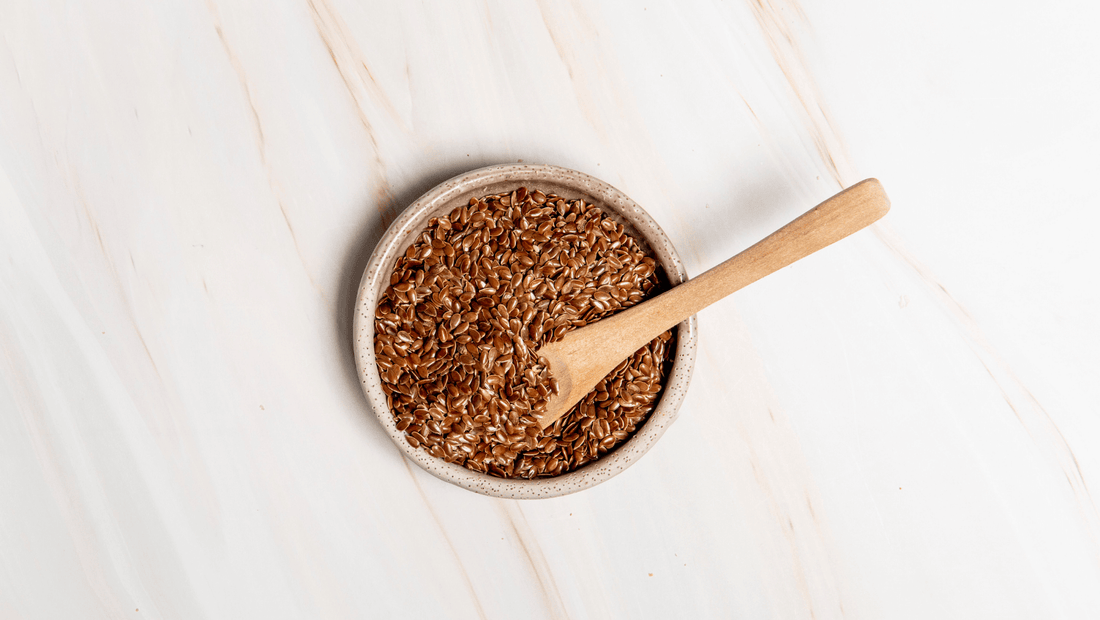Confused about what seeds to choose for effective seed cycling? In this article, we unravel the distinctions between "Ground Flaxseed vs Flaxseed Meal: The Key to Effective Seed Cycling." Seed cycling offers unique benefits, but selecting the right seeds can be perplexing. Join us as we explore the nutritional differences and shed light on the importance of making informed choices for a successful seed cycling practice.
Flaxseed has gained immense popularity in the health and wellness community due to its abundant nutritional benefits. When it comes to seed cycling, understanding the distinction between ground flaxseed and flaxseed meal is essential.
We will delve into the differences between these two forms of flaxseed and explore their role in seed cycling. Additionally, we will help you understand the correct terminology for the byproduct of flaxseed extraction, known as "flaxseed meal" or "flax meal." We will also discuss the importance of seed cycling as a natural alternative to seed oils, which can have negative health implications, particularly related to inflammation.
Ground Flaxseed vs Flaxseed Meal: Unraveling the Nutritional Benefits
Ground flaxseed refers to the finely powdered form of flaxseed, allowing for optimal absorption and utilisation of its valuable nutrients. On the other hand, flaxseed meal, also known as defatted flaxseed meal or flax meal, is the byproduct obtained after extracting oil from the seeds. Flaxseed meal tends to have a coarser texture and may have some nutrient loss during the extraction process.
For seed cycling and overall nutrient intake, it is recommended to choose ground flaxseed over flaxseed meal to ensure the retention of the seed's nutritional integrity.
As a company dedicated to providing the highest quality products, here at The Seed Cycle we prioritise the integrity and nutrient quality of the seeds we offer. That is why, for seed cycling and overall nutrient intake, we exclusively use flaxseed that is ground in small batches, maintaining the seeds' fundamental integrity and nutritional value. By grinding the flaxseed ourselves, we ensure that you receive the freshest and most nutrient-rich product available. This commitment to quality allows you to reap the full benefits of ground flaxseed in your seed cycling routine, supporting your overall well-being and hormone balance.
Understanding Flaxseed Meal: The Byproduct of Flaxseed Extraction
After oil extraction from flaxseed, the remaining product is commonly referred to as "flaxseed meal" or "flax meal." It is important to note the correct terminology for this byproduct, as it can sometimes be confused with ground flaxseed. Flaxseed meal, or defatted flaxseed meal, is the more accurate term for the byproduct obtained after removing the oil. While it may not provide the same nutrient benefits and not recommended for seed cycling, it can still be used in cooking and baking as a fiber-rich ingredient.
Seed Oils vs. Seed Cycling: A Health Perspective
Seed oils, such as those derived from flaxseed, canola, and soybeans, have gained popularity due to their omega-3 fatty acid content. However, it's crucial to understand that consuming isolated seed oils may have negative health implications. These oils are often processed, and the delicate omega-3 fatty acids can become rancid, leading to increased inflammation in the body. Additionally, the ratios of omega-3 to omega-6 fatty acids in seed oils are typically imbalanced, which can further contribute to inflammation.
Seed cycling, on the other hand, takes a holistic approach by incorporating whole seeds into the diet. By rotating specific seeds, such as ground flaxseed, pumpkin seeds, sesame seeds, and sunflower seeds, during different phases of the menstrual cycle, seed cycling aims to support hormone balance naturally. It focuses on the benefits of whole seeds, which provide essential nutrients, fiber, and plant compounds, without the negative effects associated with isolated seed oils.
The Power of Seed Cycling in Hormone Balance
Seed cycling has garnered significant attention and support from renowned experts like Dr. Brighton and Alisa Vitti, who have prescribed it to patients seeking hormone balance. Additionally, the overwhelming feedback from women who have incorporated seed cycling into their routines speaks volumes about its efficacy.
Many have reported positive outcomes, including alleviation of PMS symptoms, regulation of irregular periods, improvement in acne, relief from PCOS symptoms, management of menopause symptoms, and even enhanced fertility. The growing body of personal experiences and success stories further highlights the potential benefits of seed cycling in supporting hormonal health.
The specific seeds used in seed cycling, including ground flaxseed, contain phytoestrogens such as lignans, which can interact with estrogen receptors in the body. These interactions can help regulate estrogen production and metabolism, potentially alleviating symptoms associated with menstrual irregularities or hormone imbalances.

The Nutritional Powerhouse of Ground Flaxseed: A Source of Omega-3s, Lignans, and Health Benefits
In addition to supporting hormone balance, seed cycling offers a range of other health benefits. Ground flaxseed, in particular, is a nutritional powerhouse. It is rich in omega-3 fatty acids, which have been shown to support heart health, brain function, and reduce inflammation. Flaxseed also contains lignans, which possess antioxidant and potential estrogenic properties. These lignans may have a positive impact on heart health, as well as potential benefits in cancer prevention.
Moreover, flaxseed is an excellent source of dietary fiber, both soluble and insoluble, which aids in digestion, promotes feelings of satiety, and supports a healthy gut. It also provides various vitamins and minerals, including vitamin B1, B6, folate, magnesium, phosphorus, and manganese, contributing to overall well-being.
When incorporating ground flaxseed into your seed cycling routine, it is important to choose organic, certified flaxseed.
Organic certification ensures that the seeds are free from synthetic pesticides, herbicides, and GMOs, reducing the risk of potential hormone disruptors and ensuring a high-quality product for optimal seed cycling.
While scientific research on seed cycling and its impact on hormone balance is ongoing, anecdotal evidence and individual experiences have shown promising results. However, it's important to remember that seed cycling may not be a one-size-fits-all solution, and individual responses may vary. It is always recommended to work with a healthcare professional to develop a personalized approach that aligns with your specific needs and goals.
In conclusion, ground flaxseed and flaxseed meal play significant roles in seed cycling, with ground flaxseed offering enhanced nutrient absorption and utilisation. By incorporating these whole seeds into your diet, you can harness their nutritional benefits, including omega-3 fatty acids, lignans, fiber, vitamins, and minerals. Seed cycling provides a natural and holistic approach to hormone balance, offering a healthier alternative to isolated seed oils. Embrace the power of ground flaxseed, certified organic for optimal seed cycling, and embark on a journey towards improved well-being and hormone harmony.
Resourses
- Dodin, S., Cuerq, N., Hardouin, S., Leclerc, J., Colin, C., & LePage, P. (2013). Flaxseed for the management of menopausal symptoms: current state of knowledge. Menopause, 20(3), 250-258. doi: 10.1097/gme.0b013e31826f6a94
- Pan, A., Yu, D., Demark-Wahnefried, W., Franco, O. H., Lin, X. (2014). Meta-analysis of the effects of flaxseed interventions on blood lipids. American Journal of Clinical Nutrition, 99(2), 355-366. doi: 10.3945/ajcn.113.069401
- Sturgeon, S. R., Heersink, J. L., Volpe, S. L., Bertone-Johnson, E. R., & Puleo, E. (2018). Flaxseed consumption and urinary levels of enterolignans among young adults in the United States. Cancer Epidemiology, Biomarkers & Prevention, 27(8), 885-892. doi: 10.1158/1055-9965.EPI-17-0793
- Goyal, A., Sharma, V., Upadhyay, N., Gill, S., & Sihag, M. (2014). Flax and flaxseed oil: an ancient medicine & modern functional food. Journal of Food Science and Technology, 51(9), 1633-1653. doi: 10.1007/s13197-013-1247-9
- Phipps, W. R., Martini, M. C., Lampe, J. W., Slavin, J. L., & Kurzer, M. S. (1993). Effect of flax seed ingestion on the menstrual cycle. Journal of Clinical Endocrinology & Metabolism, 77(5), 1215-1219. doi: 10.1210/jcem.77.5.8077326
Dr. Jolene Brighten:
- Official Website: Visit Dr. Brighten's official website for information on her background, expertise, and publications: https://drbrighten.com/
- "Beyond the Pill": Dr. Brighten authored the book "Beyond the Pill," which explores hormonal birth control and provides natural solutions for women's hormone balance.
Alisa Vitti:
- Official Website: Alisa Vitti is the founder of the FLO Living Hormone Center and author of "WomanCode." Visit her official website for insights on hormone health and seed cycling: https://www.floliving.com/
- "In the Flo": Alisa Vitti's book "In the Flo" provides a comprehensive guide to understanding and optimizing your menstrual cycle for hormonal balance and overall well-being.

